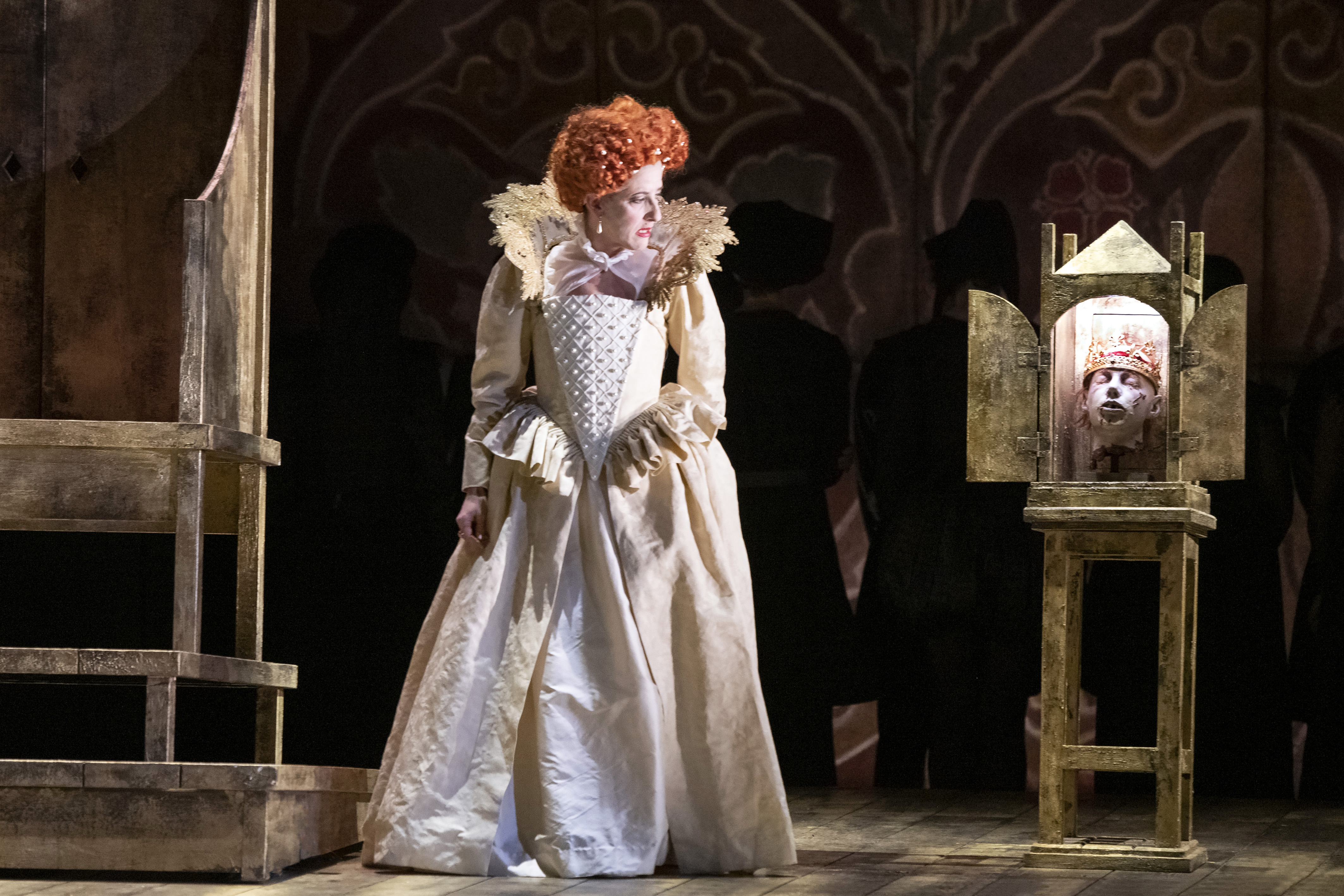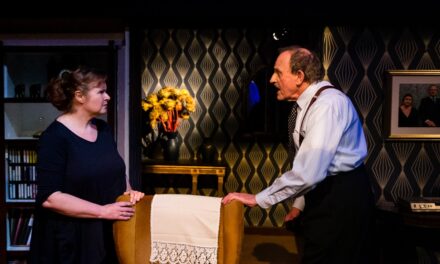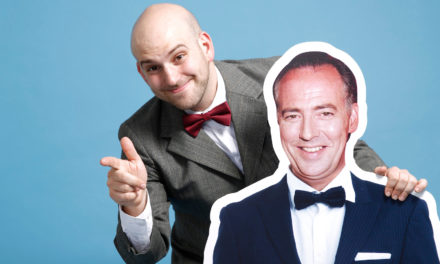MACBETH – Madeleine Pierard as Lady Macbeth and Grant Doyle as Macbeth – photos Richard Hubert Smith
Theatre with music seems to be particularly popular at the moment, with every kind of subject matter appearing to be considered suitable for this treatment. Yet if I ask someone to join me to go to a an opera, they mostly make their polite excuses. This completely baffles me, as opera almost always includes high drama, classic storylines that have stood the test of time, and unlike so much of the modern musical offerings, some sublimely beautiful music from composers who took their work to the highest levels of craftsmanship and beauty.
There are some conventions of operatic theatre which may slightly baffle the newcomer, but bursting into song to move the plot along works apparently in Hairspray, Sister Act or Miss Saigon and they seem to pack out theatres easily. Ironically Miss Saigon is a reworking of the Puccini opera Madame Butterfly, with distinctly poorer music. It seems that opera has an image problem, being seen by many as the diversion of a rich elite as in touch with real life as a stray Rees-Mogg. This is a great shame. For me the visit of a top quality company like English Touring Opera is a high point of the local theatrical calendar, and I feel we are blessed to have a venue such as Norwich Theatre Royal that can stage their shows with elan.
In the last few days we have been given a trio of operatic works which contrast strongly with each other in content and style, while all sharing a high quality of staging, design and performance from singers and orchestra. I found all three delightful and enjoyed the contrast between them. With scores from Rossini, Verdi and Mozart the current ETO programme gives us a chance to enjoy works which are not in the list of the most-performed works but are each hugely rewarding.
Elizabeth 1 by Rossini focuses on a very small part of the history of this famous Queen, her relationship with her favourite courtier The Earl of Leicester. He has returned victorious from war with Scotland, and Elizabeth clearly has a considerable passion for him. But in the course of his bellicose adventure he has fallen for, and married Matilde, daughter of Mary, Queen of Scots. Leicester confusingly brings her and her brother Enrico to court as hostages. Confiding to the Duke of Norfolk the truth of his relationship enables the sneaky Norfolk to try and use this information to his own advantage. Mary Plazas dominates the stage as a suitably imperious Elizabeth while Luciano Botelho is superb as Leicester. John-Colyn Gyeantey gives a memorable performance as the opportunistic Norfolk, whose dishonest machinations do not end well for him. A minimal set matches the very minimal plot in this work, but this gives space to enjoy the changing nuances of the story while we can also cherish the stirring music from Rossini, some of which may seem strangely familiar from other Rossini operas such as The Barber of Seville. A good tune is worth a few outings!
In sharp contrast the second night gave us Verdi’s Macbeth, an action packed drama that gives us all the details that we know from Shakespeare’s treatment of this tale of Scottish misbehaviour, madness and death. After Elizabeth we are back in familiar opera territory where the body count is as high as the tension. Madeleine Pierard is exceptionally good as Lady Macbeth with a captivating performance of remarkable power. She has an amazing voice and this score gives her the scope to show just how good she is. Grant Doyle matches her as the ambitious and trouble Macbeth, realising too late that his ruthless ambition is fatally doomed. Andrew Slater pops up both as Banquo both alive and dead from time to time to make sure that Macbeth gets truly unhinged. Mumbai-born Amar Muchhala gives us a distinctive MacDuff and a startlingly red-haired little local lad un-named in the programme stole several scenes as the infant Fleance. He fled, you know. I liked the chorus of witches dressed as if they were pastel-green nuns, making more of the power of their magic than the Bard’s version and giving a feminine power to contrast sharply with the fighting men. The modern costumes jarred at first, but worked well with the bleak set that looked more Cumbernauld housing estate than shortbread-tin castle. The set looks simple but Designer Frankie Bradshaw uses the structure to create numerous clearly defined locations in this familiar story.
For sheer scale of human upset nobody can beat the ancient Greeks when it comes to telling us a tragedy, and the third ETO opera is Mozart’s Idomeneo. Set in the aftermath of the Trojan wars the conquering king of Crete Idomeneo has sent the daughter Ilia of his defeated rival King Priam of Troy to Crete as a hostage and for a future as his concubine. She is in the care of his son Idamante and of course they fall in love with each other, shyly and reluctantly at first given the context but later quite explicitly, although this does not go down well with Elettra, daughter off Greek king Agamemnon, who herself is besotted with Idamante. Meanwhile Idomeneo is missing at sea, thought drowned. After a rough passage with the wrath of the sea gods against him he is swept onto the shores of the island and vows to sacrifice the first person he sees to the raging gods. Shortly after this Idamante pops down to the beach and rescues his dad. Oh dear. He cannot understand why his father spurns him and is generally behaving like a bear with a sore arse. Father Idomeneo just cannot cope with his self imposed pressure to kill his only son and heir. It gets even more complicated after that.

IDOMENEO-Catherine Carby as Idamante, Galina Averina as Ilia, John-Colyn Gyeantey as Arbace, Paula-Sides as Elettra, Christopher Turner as Idomeneo
Ilia is played with gentle subtlety by Galia Averina, while her rival Elettra is given an intense furious despair by Paula Sides. The target of their affections, the prince Idamante, is played by a woman, giving an interesting twist on proceedings. This role is sung quite brilliantly by Catherine Carby, whose epicene appearance on this stage is intriguing. Idomeneo is robustly portrayed by Christopher Turner, who looks every inch the tyrannical murdering king. John-Colyn Gyeantey returns to the stage as the priest and confidante Arbace, who tries to find a suitably god-friendly solution to the kings catastrophe. The problem with a love triangle is that apart from in the most advanced of cultures there is always going to be a real loser in the end, even before the one in the middle gets a death sentence from his own Pa. Angst all round, all set to the most sublimely beautiful music. Once again the bold geometric set is put to multiple uses and is a dramatic component all on its own, aided by very effective lighting.
Each opera gives us a glimpse into famous tales from history, but the presentation by English Touring Opera is utterly modern and technically very impressive. We are fortunate to have companies such as this coming to Norwich to bring theatre which represents a traditional art form at its very best yet presented in a new and effective manner. Make sure you look out for their next visit here, and for other fine companies like the Welsh National Opera coming to the Playhouse in June with another promising show – Donizetti’s Don Pasquale, set in a kebab van!
© Julian Swainson 2019
Read more about ETO here: http://englishtouringopera.org.uk






Recent Comments